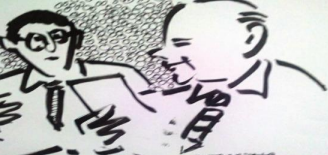It is extraordinary that the most hateful person I ever encountered was so much like me. His most extraordinary feature was that he was unremittingly ordinary. I joined a European company, and my European bosses took a fancy to me and assigned me to an important position in the headquarters, much to the annoyance of the director of the division who wanted to place his nephew in that slot. Strangely, he changed his view of me in six months and started trusting me with more responsibilities.
He entrusted me with all major reports. Then he started sending me all drafts, even by executives senior to me, to correct and to improve. This could not long remain a secret and GR, a senior manager, accosted me to ask if I was editing his letters and reports. I said discreetly that I did some editing work for the director but was not free to discuss what I edited. Five years later, GR became the senior-most executive of the department and my boss. Unexpectedly, I found I liked his analytical bent.
He wanted to see a clear analysis of the facts before he chose to make a decision and he insisted that subordinates provided him that. We got on famously, for it was also my preferred way of proceeding in a department where most assessed a situation cursorily and took an instinctive decision. Among my colleagues, when I stressed that business should be businesslike, I was a voice crying in the wilderness. GR turned to me whenever he had a doubt, and I always began by saying, “Let us look at the facts again.” This was before the days of the computer.
Advertisement
Analysis called for substantial legwork. You had to array all the facts in more than one way before you could make valid inferences. When I did it, GR liked it and told me so. I felt vindicated. I was young and naïve, and it took me time to learn that skill is no substitute for humanity. Especially when one relies on just one special skill, neglecting all others. While I loved ferreting out all the relevant data, analyzing them and arriving at a reasoned end, I realized it had to be a part of larger considerations.
You have to remember the past, what a supplier may have done for you over years. You have to think of the uncertain future, when the company may need partners’ help. Most of all you have to think of relationships, without which no business can survive. GP was single-minded and cared little for other considerations. Once the data showed something, he took it as a divine edict and acted on it without applying the brake of further exploration or humane consideration.
I am sure he used the analysis to gain his superiors’ approval and went ahead, feeling justified, no matter what the human cost. Gradually, I began to see the havoc he was wreaking with my help. For a small, nascent company we had nurtured with my support, he withdrew all business at a moment’s notice and reduced the owner and his workers to sudden penury. A vendor who had supplied us loyally and consistently through difficult times, he cut off for a minor price advantage and destroyed a long-term relationship.
A relationship had to be mutually gainful, he often said like a mantra, forgetting the simple truth that all relationships, even the closest, have their ups and downs. GP had a painful comeuppance when he applied the same approach in a dispute with a government agency. Contrary to my suggestion, he adopted a hard-nosed strategy in disputing an excise duty and found himself in a much the worse position for his effort. The penalty was enhanced instead of reduced. Our link continued, but we started to disagree more and more. GP believed himself businesslike and purpose-driven; I increasingly saw him as myopic and drearily ordinary.
I realized how short-sighted was his point of view, how impervious to the human aspects without which no endeavor can survive. It all ended when I decided to leave the company, where I had worked for many years, and went to work for another organization. There was no joy when I learned that the company, which had had a history of remarkable success, had gone belly-up in a few quick years. Many colleagues and several friends lost their jobs. Thousands of workers found their livelihood gone, their families lost their tenuous grip on security.
What I could recall were the characteristic but portentous words I heard when I met GP at a party a year after I had left our common employer, “I go where the facts go. That is what a business is all about. Nothing more.” A more ruinous philosophy of business – no less ruinous because one hears it commonly in an age of data-centered thinking – I will never hear.
Advertisement










